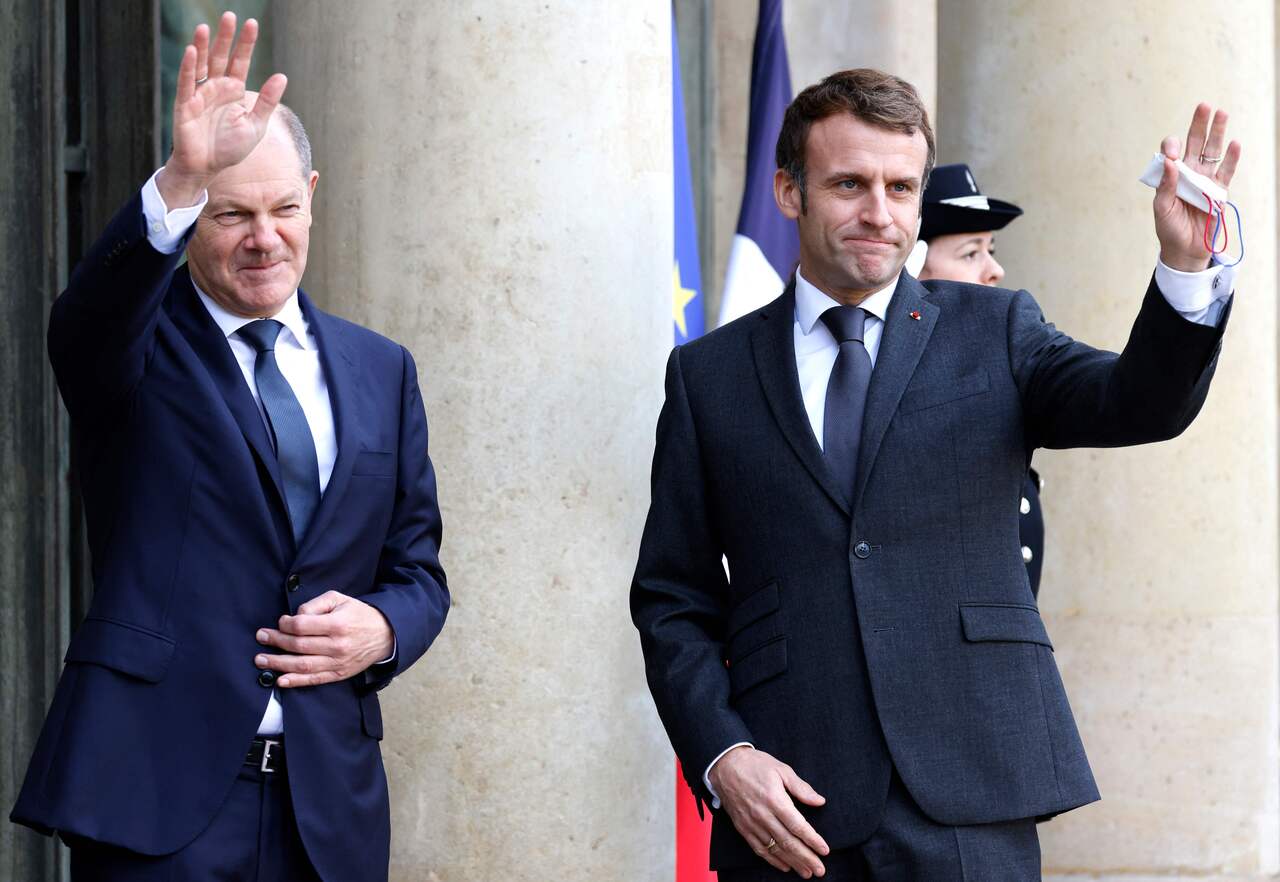New German chancellor Scholz makes European debut
Sign up now: Get ST's newsletters delivered to your inbox

German Chancellor Olaf Scholz (left) with French President Emmanuel Macron in Paris on Dec 10, 2021.
PHOTO: AFP
Follow topic:
PARIS (AFP) - German Chancellor Olaf Scholz arrived in Paris on Friday (Dec 10) for his first foreign trip, which will see him start to build a European agenda with French leader Emmanuel Macron as well as discuss tensions with Russia.
Germany's new leader, who will also stop in Brussels at the headquarters of the EU and Nato on Friday, took over from Angela Merkel on Wednesday at the end of her 16 years in power.
Mr Scholz, a centrist Social Democrat, heads a disparate new coalition of ecologist Greens and business-friendly Free Democrats, but their joint commitment to strengthening Europe's "strategic sovereignty" has raised hopes in Paris.
Mr Macron laid out an ambitious agenda on Thursday for a "Europe that is powerful in the world" during France's time as the rotating president of the 27-member Council of the European Union in the first half of next year.
After meeting with the French president, Mr Scholz will continue on to Brussels for talks with Nato Secretary General Jens Stoltenberg and EU chief Ursula von der Leyen, as well as European Council president Charles Michel ahead of a bloc summit next week.
The European response to the Covid-19 pandemic and the climate crisis, growing calls for a diplomatic boycott of the Olympics in China, and the Russian troop build-up on Ukraine's border are set to dominate discussions.
Mr Scholz already warned Moscow on Thursday of "consequences" for the Nord Stream 2 pipeline, a Russian project to deliver natural gas to Germany and a major source of friction with many partners.
As Western powers threaten punishing new sanctions against Moscow, the project could soon play a central role.
"With Nord Stream 2, Germany has the big geopolitical weapon in its hand without ever having sought it," said Mr Ulrich Speck, an analyst at the German Marshall Fund.
'Continue the Merkel course'
Laying the groundwork for the visit, Germany's new Foreign Minister Annalena Baerbock of the Greens said in Paris on Thursday that Berlin would set its stance on Russia and China in close consultation with European allies.
She praised French plans to set a carbon tax on imports when Paris assumes the EU presidency in January, while hailing the 2015 Paris climate accord as a "stellar moment in international diplomacy".
Ms Baerbock emphasised that her ministry would "help take the lead" for Berlin on future multilateral climate initiatives, as she underscored the centrality of the rule of law and human rights in the EU ahead of a stop in Poland on Friday.
However, she acknowledged that Germany, which will close all of its nuclear power plants by next year for safety reasons, did not see eye-to-eye with France in its bid to classify nuclear as a green energy source to meet Europe's net-zero climate goal.
Although Mr Scholz served as Dr Merkel's finance minister and vice-chancellor and long backed Germany's trademark budget austerity goals, he threw his weight behind massive government spending to help Europe cope with the pandemic - going further than Dr Merkel.
"Europe senses that Scholz is more likely to continue the Merkel course on the European Stability and Growth Pact" and its strict debt rules, said Ms Anne Gellinek of public broadcaster ZDF.
Cautious pledges
Mr Scholz is expected to face renewed calls for Germany to match its economic weight with more responsibility in global security affairs.
The new coalition pact makes no mention of the pledge for all Nato member states to commit two percent of their gross domestic product to defence by 2024.
Instead, it will commit "in the long run" three percent of spending to the military, diplomacy and development aid, a clause already attacked by Dr Merkel's conservatives, now in the opposition, as a "sham".
French Foreign Minister Yves Le Drian asked on Thursday for stronger German support in foreign missions, including operations against jihadist groups in the Sahel region of western Africa, saying Berlin had "an important role to play".
Political scientist Andrea Roemmele of the Hertie School of Governance expects closer cooperation with Paris on security policy under Mr Scholz.
But with the French presidential elections looming next year, Berlin will likely "take a wait-and-see stance" on projects, particularly given the threat of a strong showing for the far right.

